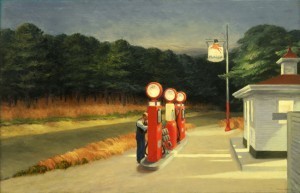What if Jack Kerouac had GPS and Yelp?
 Since I've written quite a bit about how electronic technology is transforming travel, I enjoyed reading "GPS and the End of the Road," Ari N. Schulman's essay in the Spring 2011 issue of The New Atlantis. In the essay, Schulman posits that GPS devices, along with "location awareness" apps like HearPlanet and Layar, are diminishing the sense of freewheeling travel discovery and possibility portrayed by writers like Jack Kerouac.
Since I've written quite a bit about how electronic technology is transforming travel, I enjoyed reading "GPS and the End of the Road," Ari N. Schulman's essay in the Spring 2011 issue of The New Atlantis. In the essay, Schulman posits that GPS devices, along with "location awareness" apps like HearPlanet and Layar, are diminishing the sense of freewheeling travel discovery and possibility portrayed by writers like Jack Kerouac.
"How would new technology of location affect an On the Road today?" Schulman writes. "Can we imagine its characters, and by extension ourselves, escaping into the Western night, navigating by GPS and choosing where to go with Yelp, supplied with surrounding-relevant multimedia by GeoTour, encountering city streets with their iPhones held up and overlaying the view, and still having the same adventure? Something about this image is absurd."
Schulman illustrates how Mark Twain's Huck Finn uses the river as a metaphor for adventure and discovery and escape. As technology constrained the possibilities of river travel in the 20th century, this symbol gave way to the metaphoric "road" of Kerouac's novel. "Seen in the right way," Schulman writes, "what the two novels show us is not the virtue of quitting civilization, but the freedom that comes from finding our own way through a world that is not of our own making — and with it, a glimpse of the possibility of reaching out beyond our everyday selves into something greater." By contrast, the hypothetical "GPS-enabled, location-aware adventures of Sal and Dean or Huck and Jim somehow sound dreary before they have begun, filled with anticlimax, boredom, and restlessness."
Schulman continues:
GPS navigation, in its present form, …dulls our receptivity to our surroundings by granting us the supposed luxury of not having to pay attention to them at all. In travel facilitated by "location awareness," we begin to encounter places not by attending to what they present to us, but by bringing our expectations to them, and demanding that they perform for us as advertised. In traveling through "augmented reality," even the need for places to perform begins to fade, as our openness to the world gives way to the desire to paper over it entirely. It is an admission of our seeming distrust in places to be sufficiently interesting on their own. But in attempting to find the most valuable places and secure the greatest value from them, the places themselves become increasingly irrelevant to our experiences, which become less and less experiences of those places we go.
The argument that the experience of a place is something that "must be worked for, achieved in stages and through struggles" isn't new (it's been around since at least the advent of trains and steamships), but Schulman points out how 21st century technologies are transforming our lexicon for engaging with the world:
If feeling "connected" for us means inhabiting the virtual realm, then what we most long to connect to is not what is in front of our eyes. When we speak of feeling "disconnected," then, we are confessing that we have become displaced: we are losing interest in and forgetting how to inhabit real places on their own. This displacement produces restlessness — but of a very different sort than the restlessness that motivates the traveler to go forward into the world. In fact, this restlessness is opposed to the traveler's impulse: it seeks its relief not in the real world but the virtual.
Schulman's full essay is online here. For an inverse perspective — one that explores how digital technology could be broadening the lives of normal folks in Africa — check out J.M. Ledgard's essay "Digital Africa" in the Spring 2011 issue of Intelligent Life magazine.
Rolf Potts's Blog
- Rolf Potts's profile
- 321 followers



